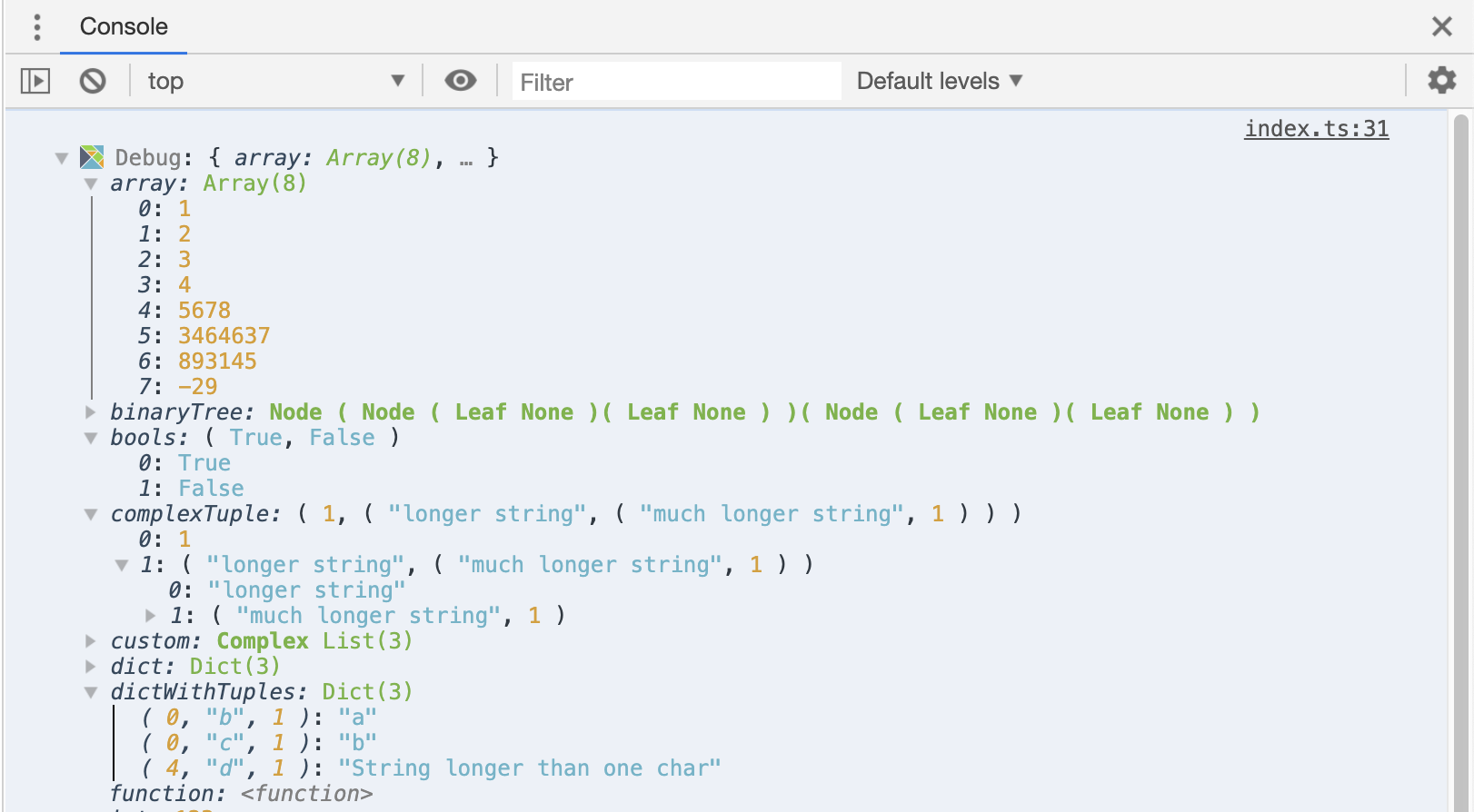The standard Elm Debug.log console output:
and the same output with this package
The main module exposes register() function that replaces your console.log() and try to parse each incoming message with Elm parser. If it fails, it would pass the original message.
Right now you can insert only alphabet characters and spaces as a Debug.log tag.
-- this would parse successfuly
Debug.log "Some tag string" thingToPrintToConsole
-- this would NOT BE PARSED
Debug.log "Some String (with non [a-zA-Z] chars or numbers in it) " thingToPrintToConsole
This limitation is due to the problem recognizing arbitrary tag text from the rest of the types. I'm aware of that limitation and it is something that would be addressed in the upcoming versions. Thanks for understanding.
Just install this module with Yarn:
yarn add -D elm-debug-transformer
or NPM:
npm install elm-debug-transformer
Roman Potashow pointed out on Elm Slack that you can use the NPM package directly without the need of installing it.
<script src="https://unpkg.com/elm-debug-transformer@<VERSION>/dist/elm-console-debug.js"></script>
<script>ElmConsoleDebug.register()</script>
There is a nice summary of the usage in Alex Korban's article Get improved Debug.log output in the browser console
Register the console debugger in your main JS file before you initialize Elm application:
import * as ElmDebugger from 'elm-debug-transformer';
ElmDebugger.register();
// rest of application
Here's a sample HTML for your reference:
<!DOCTYPE html>
<html lang="en">
<head>
<meta charset="UTF-8">
<meta name="viewport" content="width=device-width, initial-scale=1.0">
<title>My Elm App</title>
</head>
<body>
<main></main>
<script src="https://unpkg.com/elm-debug-transformer@latest/dist/elm-console-debug.js"></script>
<script>ElmConsoleDebug.register({simple_mode: false, debug: false, limit: 10000});</script>
<script src="elm.js"></script>
<script>
var app = Elm.Main.init({ node: document.querySelector('main') });
</script>
</body>
</html>Since version 1.1.0 the parser function is exposed as well, so you can use it to parse Debug.log output into JSON structure and work with it later as you wish.
import {parse} ElmDebugger from 'elm-debug-transformer';
const parsedValue = parse("debug tag: [1,2,3]");
Available in Chrome 47 and higher and in Firefox 116 and higher.
The output object is kind of chatty right now (it carries information about parsed type etc. - less verbose version is worked on right now).
If your browser is Firefox 116 and above or if it have have Chrome dev tools, you can enable custom formatters so you get less noise and more nice output.
- Open DevTools
- Go to Preferences ("cog wheel" icon in the upper right corner of DevTools > Preferences > Console)
- Check-in "Enable custom formatters"
- Close DevTools
- Open DevTools
- Open DevTools
- Go to Settings ("three dots" icon in the upper right corner of DevTools > Settings F1 > Advanced settings)
- Check-in "Enable custom formatters"
- Close DevTools
- Open DevTools
Note: You might need to refresh the page first time you open Console panel with existing logs - custom formatters are applied only to newly printed console messages.
That way the Debug.log would output simpler JS object without type information. Tuple, Set, Array and List would become arrays and Dict would become JS object with keys and values.
Options object can be provided to register function:
import * as ElmDebugger from 'elm-debug-transformer';
ElmDebugger.register({simple_mode: true, debug: false, limit: 10000});
| parameter | type | description | default value |
|---|---|---|---|
limit |
number | number of message characters after which the parser won't parse the message. (Helpful for bypass the parsing of large datastructures) | 1 000 000 |
debug |
boolean | include original message and parser error with the message | false |
simple_mode |
boolean | force output to be in simple object format | false |
This would probably not see the light of the day without Matt Zeunert and his blogpost about writing custom formatters. Thank you!

